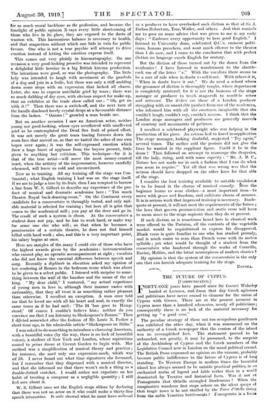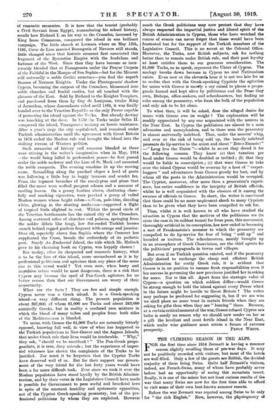THE FUTURE OF CYPRUS.
LC0MMIIIIICATED.1
FORTY-ONE years have passed since Sir Garnet Wolseley landed at Larnaca, and from that day Greek agitators and politicians have never ceased to clamour for the union of Cyprus with Greece. There are at the present moment in Cyprus more than a hundred advocates, nearly all politicians ; consequently there is no lack of the material necessary for getting up " a good case."
The peculiar strategy of these not too scrupulous gentlemen was exhibited the other day, when it was announced .on the authority of a Greek newspaper that the cession of the island was an accomplished fact. The statement proved to be unfounded, not greatly, it may be presumed, to the surprise of the Archbishop of Cyprus and the Greek members of the Legislative Council now in London on the usual political errand. The British Press expressed no opinion on the rumour, probably because public indifference to the future of Cyprus is of long standing. To Western Europe in modern times the beautiful island has always seemed to be outside practical politics, in an enchanted realm of legend and fable rather than in a world dominated by Treaties and historical facts. Was it not at Famagousta that Othello strangled Desdemona ? When the imaginative wanderer first steps ashore on the silent quays of that tragic town is he not-thrilled by the Torre d'Okllo rising from the noble Venetian battlements ? Famagousta is a focus
of romantic memories. It is here that the tourist (probably a Civil Servant from Egypt), remembering his school history, recalls how Richard I. on his way to the Crusades, ineensed by King Isaac Comnenus, conquered the island in one brilliant t.ampaign. The little church at Larnaca where on May 12th, 1191, Cceur de Lion married Berengaria of Navarre still stands, little changed since that historic moment first associated this fragment of the Byzantine Empire with the feudalism and fortunes of the West. Since then they have become so inextricably blended that at Famagousta under the Prayer Carpets of the Faithful in the Mosque of San Sophia—but for the Minaret still outwardly a noble Gothic structure—you find the superb Brasses of Norman Knights. Under the Plantagenets' shadow Cyprus, becoming the outpost of the Crusaders, blossomed into noble churches and feudal castles, but all touched with the glamour of the East. Sold by Richard to the Knights Templars, and purchased from them by Guy de Lusignan, titular King of Jerusalem, whose descendants ruled until 1464, it was finally handed over to the Venetian Republic as the only Power capable of protecting the island against the Terks. But already destiny was knocking at the door. In 1370 the Turks under Selim conquered the island, Famagousta making an heroic resistance. After a year's siege the city capitulated, and remained under Turkish administration until the agreement with Great Britain in 1878 ended the Moslem rule and brought the island into the shifting stream of Western politics.
Such memories of history and romance blended as these were stirring in the writer's imagination when in May, 1914 —the world being lulled in profoundest peace—he first passed wider the noble archway and the Lion of St. Mark and mounted the noble ramparts. The evening sunshine lit up the moving scene. Scrambling along the parched slopes a herd of goats was following a little boy in baggy trousers and scarlet fez. From the topmost branches of the eucalyptus and pines that filled the•.moat were wafted pungent odours and a murmur of rustling leaves. On a grassy bastion above, chattering cheerfully and smoking cigarettes, were perched a group of veiled Moslem women whose bright robes—saffron, pale-blue, dazzling white, glowing in the slanting sunbeams—suggested a flight of tropical birds alighted to rest. Within the proud circle of the Venetian battlements lies the ruined city of the Crusaders. Among scattered relics of churches and palaces, springing from the nobler debris like fungi, low flat-roofed Turkish houses crouch behind ragged gardens fragrant with orange and jasmine. Over all, especially above San Sophia where the Crescent has supplanted the Cross, broods the melancholy of its pathetic past. Surely An Enchanted Island, the title which Mr. MuHock gave to his charming book on Cyprus, was happily chosen !
But to-day, after its chequered and romantic history, what is to be the fate of this island, more encumbered as it is by professional politicians and agitators than any place of the same size in this vexed world ? Yet even now, when hasty and impulsive action would be most dangerous, there is a risk that Cyprus may become the spoil of Pan-Greek agitators for no better reason than that our Government are weary of their importunity.
What are the facts ? They are few and simple enough. Cyprus never was a Greek island. It is a Greek-speaking island—a very different thing. The present .population is about 307,000, of whom 61,000 are Turks and about 243,000 nominally Greeks, but in reality a confused race mixture in which the blood of many tribes and peoples from both sides of the Mediterranean is blended.
To union with Greece the 61,000 Turks are naturally bitterly opposed, knowing full well, in view of what has happened to the Turkish populations in New-Greece and the Aegean Islands, that under Greek rule their lives would be intolerable. " Why," they ask, " should we be sacrificed ? " The Pan-Greek propagandists, it is true, deny misrule ; but the experience of impartial witnesses has shown the complaints of the Turks to be justified. Nor must it be forgotten that the Cypriot Turks have deserved well of us. But for their support our government of the very island for the last forty years would have been a fax more difficult task. Ever since we took it over the Moslem population have stood loyally by the British Administration, and by their votes in the Legislative Council have made it possible for Government to pass useful and beneficial laws in spite of the constant hostility and systematic opposition, not of the Cypriot Greek-speaking peasantry, but of the profeesional politicians by whom they are exploited. However much the Greek politicians may now protest that they have always respected the impartial justice and liberal spirit of the
British Administration in Cyprus, those who have watched the course of events can never forget that these would have been frustrated but for the support of the Turkish members of the Legislative Council. This is no secret at the Colonial Office. Moreover, the Turks, now British subjects, ask for nothing better than to remain under British rule, and their past loyalty at least entitles them to our generous consideration. The 61,000 Turks, so to speak, represent the Ulster of Cyprus. The analogy breaks down because in Cyprus no real Nationalism exists. Even now at the eleventh hour it is not too late for us to realize that with the Greek-speaking Cypriote the agitation for union with Greece is merely a cry raised to please a propaganda fanned and kept alive by politicians and the Press they own, Bishops, office-seekers, and schoolmasters, but finding no echo among the peasantry, who form the bulk of the population and only ask to be let alone.
To what then, it will be asked, does the alleged desire for union with Greece owe its weight ? The explanation will be readily appreciated by any one acquainted with the usurers in the Near East. In Cyprus the politicians are almost to a mau advocates and moneylenders, and to these men the peasantry is almost universally indebted. Thus, under the usurers' whip, and ever at the risk of being sold up, the heavily indebted peasants do lip-service to the union and shout " Zeto e Enossis !" —" Long live the Union "—whilst in secret they dread it for the following reasons. They know (a) that taxation per head under Greece would be doubled or trebled ; (b) that they would be liable to conscription ; (c) that were Greece to take over the island Cyprus would be overrun by a host of " carpetbaggers " and adventurers from Greece greedy for loot, and b.y whom all the posts in the Administration would be occupied. The Cypriot, moreover, after more than a generation's experience, has entire confidence in the integrity of British officials, whilst he is well acquainted with the absence of it among the swarms of officials in Greece. In short, the writer is convinced that there could be no more unpleasant shock to many Cypriots than to be given what they have been compelled to ask for.
Thus, whilst it is well known to all who have studied the situation in Cyprus that the motives of the politicians are (to state the case in its mildest terms) far from pure, this movement, thoroughly artificial in its conception, has now ended in becoming a sort of Frankenstein7s monster to which the .peasantry are compelled to do lip-service for fear of being " sold up " and branded as traitors. The schoolmasters, mostly brought up in an atmosphere of Greek Chauvinism, are the chief agents for the politicians' propaganda in towns and villages.
But even if no Turkish question existed, and if the peasantry really desired to exchange the cheap and efficient British Administration for costly Greek rule, it is evident that Greece is in no position to assume fresh responsibilities even if her success in governing the new-provinces justified her masking for more. Nor is this all. Apart from the strategic value of Cyprus—a question on which soldiers differ—would Greece be strong enough to hold the island against every Power which in the future might be hostile to Great Britain ? The write/ may perhaps be pardoned for suggesting it, but if we are wise we shall place no more trust in certain friends when they are asking for gifts than when they are " bearing" them. Because, at a certain critical moment of the war, Greece refused Cyprus as a bribe is surely no reason why we should now confer on her as a gift the loveliest and most fertile island in the Near East, which under wise guidance must attain a future of extreme prosperity. Filter WHITE.



































 Previous page
Previous page